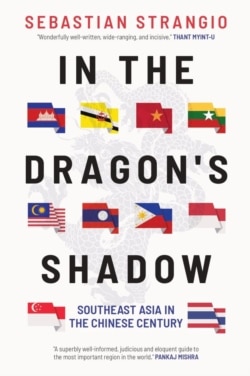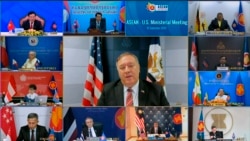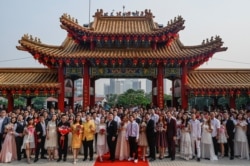Editor’s Note: Sebastian Strangio, the author of “Hun Sen’s Cambodia,” spoke to VOA Khmer’s Men Kimseng in September about his new book, “In the Dragon’s Shadow.” The book explores the role of China in today’s Southeast Asia and its increasing sway. Strangio analyzes each Southeast Asian country’s relationship with the economic superpower and the challenges increased investments and geopolitical influence from Beijing bring to the region. Some regional countries strategically assert themselves, at times, with China, such as Vietnam, currently engaged in a spirited contest with its larger northern neighbor over its incursions into the South China Sea. Others, like Cambodia, have made a whole-hearted embrace of Beijing in return for increased economic activity and Chinese disinterest in domestic politics and human rights violations.
VOA: Your new book, “In the Dragon’s Shadow,” features China's rise in Southeast Asia and how it approaches each country with its economic policy. Tell us about the impact of China's rise in Southeast Asia?
Strangio: The impact of China across the region has been far-reaching in every domain. Everything from trade and investment links, to state-led infrastructure development, to the immigration of Chinese workers, to the tourism that China has brought to the region. We’ve seen China over the past couple of decades go from sort of a mid-level player to, in many ways, the most dominant economic presence in the region.
VOA: What role does Cambodia play in China's efforts to dominate the region?
Strangio: Cambodia is being a useful ally for Beijing. It has been happy to support Chinese prerogatives and interests. We all remember the ASEAN meeting in 2012 in Phnom Penh when the Cambodian delegation was able to hold up the release of a joint communique, which contained fairly mild language about the South China Sea and the dispute that was then unfolding between China and the Philippines over Scarborough Shoal. Cambodia has been useful in supporting China within ASEAN and preventing any sort of anti-China, or what it perceives to be anti-China, the consensus from forming. You know, there are also the rumors that Cambodia might one day host some form of Chinese military or naval presence that would be potentially useful for China in that it would give it a naval logistics base, refueling base, on the other side of the disputed South China Sea. Although of course many details about any agreement still remain shrouded in secrecy.
VOA: China is using its Belt and Road Initiative, which is commonly known to open doors in the region and other parts of the world. How much does it help boost the regional economy and China’s dominance and influence?
Strangio: Well, Chinese state-led infrastructure development holds out at least the potential for the economic transformation of the region. As in China itself, the construction of vital infrastructure forms the backbone to the developing economies, especially the poorer nations of the region.
In practice, the picture is a lot more messy. Chinese projects [globally] have come with a lot of negative side effects, including evictions of local residents to make way for hydropower dams; the impact of projects, like hydropower dams on the environment; the influx of Chinese workers to work on these projects, which is one of the key conditions that China often attaches to Belt and Road Initiative projects; and concerns about debt, about becoming over-indebted to Chinese state-owned banks and becoming over-reliant on Beijing's largesse.
So, it's sort of, for Southeast Asian countries, a common challenge, to try and benefit from the economic resurgence of China and what China is offering to the region and the world in terms of the BRI and funding for infrastructure, construction and those sorts of things, while also ensuring they safeguard their sovereignty and not accept any onerous Chinese demands. I think what we've seen in Myanmar and Malaysia, where key deals either have been canceled or renegotiated, is that Southeast Asian states actually do have a fair deal of agency in how they go about engaging with the BRI and other Chinese initiatives. In some sense, instead of being just victims of the Belt and Road, what we're seeing is Southeast Asian nations are beginning to shape it, to a certain extent.
VOA: How effective is the Trump Administration’s Indo-Pacific strategy in assuring allies in the region and also countering China’s BRI?
Strangio: The Trump administration's policy towards China, and of course that dictates its policy toward Southeast Asia, has been a very difficult thing to pin down. On the one hand, we have Secretary [Mike] Pompeo talking in these sorts of fire and brimstone ideological terms about a Cold War between the free world and authoritarian China. It is staking out that this is a battle of values with China and that we have to get all of our allies onside. And then we have President Trump, who has frequently not only dealt with dictators and autocrats but has actively praised their methods. So, it's very hard to know exactly. I think a lot of Southeast Asian governments are still a bit confused as to what the Indo-Pacific strategy actually means. I think that they definitely support a stronger American investment in the region, in terms of its relationships and its partnerships. But, they're also concerned about being conscripted into, and they’re very reluctant to be conscripted into, any coalition led by the U.S. that's aimed, whether explicitly or otherwise, at containing China's power.
VOA: How much do Chinese tourists help in promoting China's soft power and people-to-people relations?
Strangio: Well, I think it's been a bit of a rocky ride. I think the first thing to mention is that there is not much tourism going on now because of the [COVID-19] pandemic. All those cruise ship visits that I described [in the book] have come to a very rapid halt. But before the onset of the pandemic, Chinese tourist numbers to Southeast Asia and Chinese overseas travelers more generally [worldwide] were reaching unprecedented levels. Southeast Asia is a very welcoming region for the Chinese people, as it is for many of us in the West. In terms of soft power, I think tourism has actually created some complications. I think that Chinese tour groups, at least in the initial wave of Chinese outbound tourism, developed quite a bad reputation in many Southeast Asian countries. I think this was partly due to their bad behavior. It was also partly due to entrenched prejudice on the part of certain Southeast Asian countries.
The suddenness with which Chinese tourism shot up in the region has created a lot of tensions and strains and once the pandemic is over and it begins to increase once again, I think, over time, people probably will become used to each other. Southeast Asian countries will want Chinese tourists to return as soon as possible to get their tourism industries back up and running after many months of lockdown.
VOA: Your book also touches on the [ethnic] Chinese diaspora and the Chinese who are now trying to woo them, but have been met with some resistance. Tell me more about that.
Strangio: This is a very complex issue. I mean ethnic Chinese have been present in Southeast Asia for centuries. In some places, they were always seen sort of as outsiders. When Chinese nationalism rose at the end of the 19th and early 20th centuries, a lot of Chinese immigrants in Southeast Asia identified with their homeland. They maintained close links there.
A lot of Southeast Asian nationalists, where nationalism was also rising at that point, began to see the Chinese as sort of not really part of the national community. They didn't have loyalty to the new nation of Indonesia or the new nations of Malaysia or Thailand. So, being accepted as members of these communities has been a very long and difficult process. The acceptance of these communities into the national fabric of the Southeast Asian countries has relied upon there being a very firm division between their affinity, as you know, their cultural affinities with China and their economic connections to China that some of them have, and the idea of political loyalty to China. These things have to be very firmly separated.
The problem now with what the Chinese government is doing is that it is increasing its outreach to these communities. It is describing them as members of the great Chinese family. I think what this is doing is erasing that very important distinction between ethnic and cultural affinities and political loyalty. That’s going to have two main effects. The first effect is that it's going to create massive complications for China in its attempt to broaden its influence in Southeast Asia. This is an incredibly sensitive issue for many Southeast Asian governments, particularly the Indonesians. It's also a sensitive issue in Malaysia and in Myanmar. The second thing is that it could boomerang on the ethnic Chinese of these countries themselves, who have frequently been subject to discrimination, prejudice, and sometimes, violence. This is not a good development for them. So, I think that while China's economic rise has allowed many ethnic Chinese in Southeast Asia to profit from business with the mainland, it also brings challenges in the form of this cultural outreach, which seeks to muddy those distinctions that I discussed earlier and puts the ethnic Chinese in Southeast Asia in a very difficult position.
VOA: China is trying to gain influence in the region and other parts of the world through its soft power, by giving scholarships, donations, which your book also touches on. What is the reaction of local communities there [around Southeast Asia] because here in the U.S. we started to have second thoughts when it comes to some institutions or educational, cultural centers that the Chinese have set up?
Strangio: I think that the People's Republic of China and the ruling Communist Party have never quite understood soft power. I think that they fail to recognize that soft power is not something that can be planned and directed centrally. It is something that emerges from within a society, organically. And I think that this has been the great strength of the United States historically. The things that attracted many young Eastern Europeans to the United States and American culture and helped to bring down the Soviet empire were things that were not planned by the U.S. state. This sort of image of America as a society where anything was possible and that the individual and their preferences were respected by the state.
[China] wants a form of soft power in which it controls everything from the top on down and ensures that this soft power does not escape its control. I think that on the ground in Southeast Asia, we see this failing again and again. Chinese officials generally have a tin ear for public concerns about Chinese investments or Chinese actions. I think that China's re-emergence as a great power in Southeast Asia has been accompanied by a sort of imperial high handedness, which doesn't take the interests and outlooks of Southeast Asian countries seriously. I think that this is something that the U.S. is guilty of to an extent but in China's case, I think we see a sort of official blindness, which is conditioned by and worsened by China's nature as a one-party authoritarian state.
VOA: In the region of Southeast Asia, each country faces its own challenges, from domestic political issues to regional issues like human trafficking, drug trafficking, and terrorism. How will China help countries handle these issues?
Strangio: China has deepened its involvement in all of these areas over the past couple of decades. It is taking a much more active role in fighting drug trafficking in the Golden Triangle, and the flow of contraband across the region's borders. How successful it has been is another question, but it has resulted in a marked deepening of China's security presence in the upper reaches of the Mekong River. I think one of the greatest appeals of Chinese support has been the fact that it doesn't lecture governments about good governance or human rights. The Chinese government does not condition its engagement on the nature of the domestic political governance of the nations in question. We do see a pattern across the region of when a country comes under fire from Western governments for democratic backsliding or human rights abuses, the Chinese are generally able to benefit from that alienation.
This is something we’ve seen obviously in Cambodia. I think this is probably the most stark example. But we also see it in Myanmar with the situation of atrocities being committed against the Rohingya by the Myanmar military. We see it in Thailand to a certain extent, in the Philippines very clearly under [President Rodrigo] Duterte, and also in Malaysia under Najib [Razak]. When the West distanced themselves from Najib’s scandal-ridden government, the Chinese sidled up with offers of support and understanding for the difficulties he found himself in, so to speak. So, I think that this remains one of China's most important advantages in the region.
VOA: Last question. What will be China’s image in the post-COVID-19 era?
Strangio: I think the COVID-19 pandemic in many ways has just deepened the magnified the perceptions of China that already existed. Which is that system in some ways is capable of egregious failure, but is also capable of ruthless efficiency. I think in Southeast Asia there is a certain amount of respect and admiration for China's ability to control it. There's also a certain amount of gratitude for the aid that China is offering for these countries to fight their pandemics as well. But this is not going to erase the fears and suspicions that will always cling to China and its activities in the region.
I think one problem is that the U.S. has attempted to blame the pandemic on China and to promise retribution. I think it's very clear in Southeast Asian capitals, this is a way of the Trump administration deflecting attention away from its own terrible handling of the crisis and is plainly geared towards his reelection in November. We’re at the beginning of a very long and protracted competition over vaccines and I think that, as in every other field, Southeast Asia is going to become a field of competition for dueling models of the vaccine. It can stand to benefit greatly if it's agile enough to take advantage of this tension between the U.S. and China, but it could also pose a danger for the nations of the region that they could be sucked into one orbit or another, and put themselves in a difficult position between the two superpowers.












